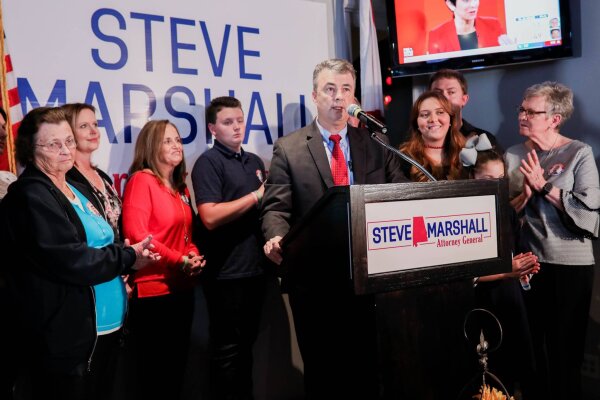Alabama Attorney General Steve Marshall Opposes Federal Reclassification of Marijuana

08/02/2024
Alabama Attorney General Steve Marshall, joined by Republican attorneys general from ten other states, has publicly opposed the federal government's proposal to reclassify marijuana as a less dangerous drug. Marshall argues that marijuana should remain among the most dangerous drugs, citing concerns about its link to rising homelessness, welfare dependence, and other societal issues.
"Expanding access to marijuana also causes a host of secondary problems," Marshall stated in a press release. "It increases both the number and severity of motor vehicle accidents and creates problems in enforcing laws that prohibit driving while intoxicated."
Currently, marijuana is classified alongside heroin and LSD under federal guidelines, designated as having “no currently accepted medical use.” The proposed reclassification would move marijuana to the same category as ketamine, which remains illegal for recreational use. Experts clarify that this change would not legalize marijuana but could grant tax breaks to dispensaries and marijuana businesses.
Marshall criticized the Biden administration's approach, saying, “The Biden-Harris administration’s rush to legalize marijuana is outside the bounds of the DOJ’s authority and will lead to disastrous consequences. This is not the first time this Administration has failed to ‘follow the science’ in favor of a cheap ploy to desperately score some points with voters before November.”
Despite more than half of U.S. states legalizing marijuana for recreational use, Alabama remains an exception. Although Alabama legalized medical marijuana three years ago, the program has yet to be implemented. Experts, including Tim Douthit, chief trial attorney at the Madison County District Attorney’s office, indicate that the federal reclassification would have minimal impact on Alabama law, which strictly regulates marijuana possession and sales.
In a letter, the coalition of attorneys general expressed concerns about the public health risks associated with increased marijuana access, stating that it could exacerbate societal issues like homelessness, welfare dependence, reduced workplace productivity, and increased anxiety and suicidal ideation. They emphasized that marijuana use among homeless populations is often a result of the stress of homelessness rather than a cause.
Alabama’s marijuana laws are stringent, with possession charges ranging from misdemeanors to felonies based on the perceived intent of use. Cities like Birmingham and Tuscaloosa have moved towards issuing tickets for low-level offenses, with Mobile considering similar measures.
The federal reclassification proposal must still undergo review by the White House Office of Management and Budget, a public comment period, and an administrative judge's evaluation before potential adoption.
Reference
"Expanding access to marijuana also causes a host of secondary problems," Marshall stated in a press release. "It increases both the number and severity of motor vehicle accidents and creates problems in enforcing laws that prohibit driving while intoxicated."
Currently, marijuana is classified alongside heroin and LSD under federal guidelines, designated as having “no currently accepted medical use.” The proposed reclassification would move marijuana to the same category as ketamine, which remains illegal for recreational use. Experts clarify that this change would not legalize marijuana but could grant tax breaks to dispensaries and marijuana businesses.
Marshall criticized the Biden administration's approach, saying, “The Biden-Harris administration’s rush to legalize marijuana is outside the bounds of the DOJ’s authority and will lead to disastrous consequences. This is not the first time this Administration has failed to ‘follow the science’ in favor of a cheap ploy to desperately score some points with voters before November.”
Despite more than half of U.S. states legalizing marijuana for recreational use, Alabama remains an exception. Although Alabama legalized medical marijuana three years ago, the program has yet to be implemented. Experts, including Tim Douthit, chief trial attorney at the Madison County District Attorney’s office, indicate that the federal reclassification would have minimal impact on Alabama law, which strictly regulates marijuana possession and sales.
In a letter, the coalition of attorneys general expressed concerns about the public health risks associated with increased marijuana access, stating that it could exacerbate societal issues like homelessness, welfare dependence, reduced workplace productivity, and increased anxiety and suicidal ideation. They emphasized that marijuana use among homeless populations is often a result of the stress of homelessness rather than a cause.
Alabama’s marijuana laws are stringent, with possession charges ranging from misdemeanors to felonies based on the perceived intent of use. Cities like Birmingham and Tuscaloosa have moved towards issuing tickets for low-level offenses, with Mobile considering similar measures.
The federal reclassification proposal must still undergo review by the White House Office of Management and Budget, a public comment period, and an administrative judge's evaluation before potential adoption.
Reference







